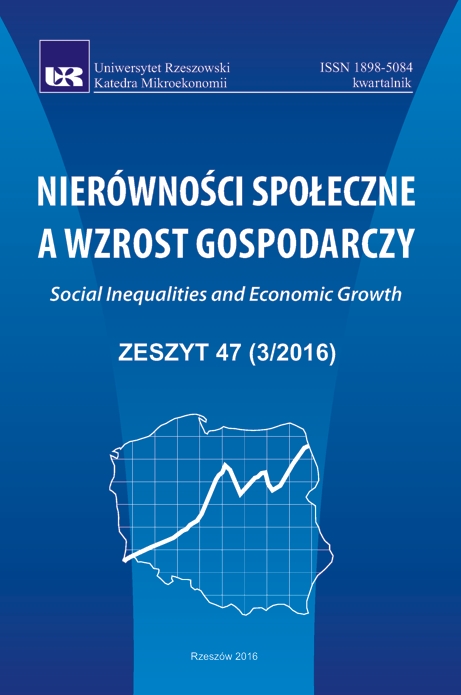Rola polityki fiskalnej w ograniczaniu nierówności dochodowych w warunkach kryzysu ekonomicznego – doświadczenia wybranych państw UE
DOI:
https://doi.org/10.15584/nsawg.2016.3.15Słowa kluczowe:
polityka fiskalna, nierówności dochodowe, państwa UEAbstrakt
Skala zjawisk kryzysowych w gospodarce światowej towarzysząca załamaniu gospodarczemu z roku 2008 wpłynęła na rewizję neoliberalnego paradygmatu o tym, że nierówności stanowią pozytywną motywację do aktywności ekonomicznej, innowacyjności i kreatywności, sprzyjając wzrostowi gospodarczemu. W podobny sposób ewoluują w ostatnim czasie także poglądy na temat możliwości wykorzystania polityki fiskalnej do realizacji funkcji wyrównawczych. W kontekście opisanej ewolucji poglądów szczególnego znaczenia nabiera zatem poszukiwanie optymalnych metod prowadzenia polityki interwencyjnej pozwalających realizować zakładane cele gospodarcze i społeczne, a pozbawionych jednocześnie krytykowanych przez przedstawicieli myśli liberalnej mankamentów antywzrostowych. Celem artykułu jest analiza i ocena zakresu oraz skuteczności wykorzystania niektórych instrumentów polityki fiskalnej do łagodzenia nierówności dochodo-wych w warunkach ostatniego światowego kryzysu ekonomicznego. W badaniach wykorzystane zostały doświadczenia wybranych 20 krajów Unii Europejskiej (UE), będących także członkami Organizacji Współpracy Gospodarczej i Rozwoju (OECD), obejmujące lata 2007–2012.Downloads
Download data is not yet available.
Pobrania
Opublikowane
2020-11-11
Jak cytować
Wójtowicz, K. (2020). Rola polityki fiskalnej w ograniczaniu nierówności dochodowych w warunkach kryzysu ekonomicznego – doświadczenia wybranych państw UE. Nierówności Społeczne a Wzrost Gospodarczy, 3(47), 205–216. https://doi.org/10.15584/nsawg.2016.3.15
Numer
Dział
Artykuły
Licencja
Prawa autorskie (c) 2016 Uniwersytet Rzeszowski

Utwór dostępny jest na licencji Creative Commons Uznanie autorstwa – Na tych samych warunkach 4.0 Miedzynarodowe.


